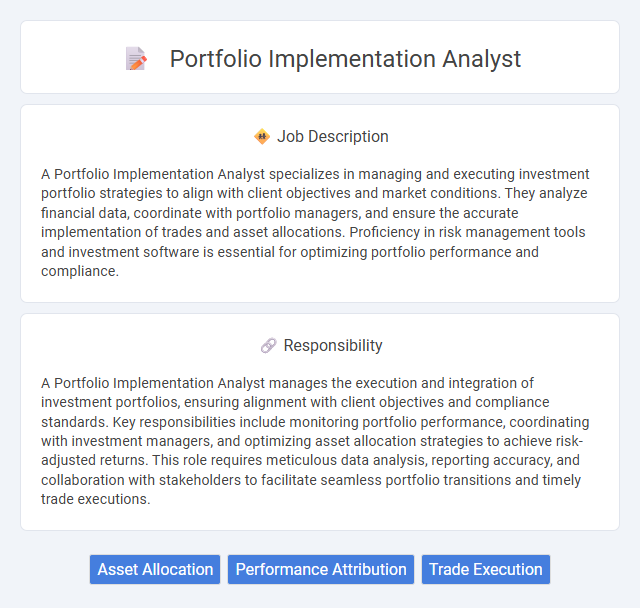
A Portfolio Implementation Analyst specializes in managing and executing investment portfolio strategies to align with client objectives and market conditions. They analyze financial data, coordinate with portfolio managers, and ensure the accurate implementation of trades and asset allocations. Proficiency in risk management tools and investment software is essential for optimizing portfolio performance and compliance.
Individuals with strong analytical skills and attention to detail are likely to be well-suited for a Portfolio Implementation Analyst role, as the job requires managing complex financial data and ensuring accurate execution of investment strategies. Candidates who thrive in fast-paced, dynamic environments with a focus on process improvement and clear communication may find this position compatible with their strengths. Those lacking an aptitude for data analysis or struggling with tight deadlines might face challenges in meeting the role's demands.
Qualification
A Portfolio Implementation Analyst requires strong financial modeling skills, proficiency in portfolio management software, and experience with transaction processing. A bachelor's degree in finance, economics, or a related field is often essential, while certifications such as CFA or PMP enhance qualifications. Strong analytical abilities, attention to detail, and effective communication skills are critical for successful portfolio execution and reporting.
Responsibility
A Portfolio Implementation Analyst manages the execution and integration of investment portfolios, ensuring alignment with client objectives and compliance standards. Key responsibilities include monitoring portfolio performance, coordinating with investment managers, and optimizing asset allocation strategies to achieve risk-adjusted returns. This role requires meticulous data analysis, reporting accuracy, and collaboration with stakeholders to facilitate seamless portfolio transitions and timely trade executions.
Benefit
Portfolio implementation analysts likely enhance investment strategies by efficiently translating portfolio decisions into actionable trades, reducing operational risks. They probably improve communication between portfolio managers and trading desks, resulting in smoother execution and potentially higher returns. Their expertise may lead to cost savings by identifying and resolving implementation inefficiencies early on.
Challenge
The role of a Portfolio Implementation Analyst likely involves navigating complex financial data and market fluctuations, presenting significant analytical challenges. The probability of encountering tight deadlines and the need for precise coordination with multiple teams may increase the difficulty of ensuring seamless portfolio transitions. Handling evolving regulatory requirements and technology integration could further complicate effective implementation strategies.
Career Advancement
Portfolio Implementation Analysts play a crucial role in managing and executing investment strategies by ensuring seamless integration of portfolio changes and client directives. Mastery of financial software, strong analytical skills, and in-depth knowledge of market regulations pave the way for career progression into senior analyst roles, portfolio management, or risk analysis positions. Continuous professional development through certifications such as CFA or PMP significantly enhances promotion prospects and opens opportunities in strategic decision-making and leadership within asset management firms.
Key Terms
Asset Allocation
A Portfolio Implementation Analyst specializing in asset allocation plays a critical role in executing investment strategies by translating strategic asset allocations into actionable portfolio transactions. They ensure precise rebalancing and alignment of asset classes such as equities, fixed income, and alternative investments according to risk-return objectives, while monitoring market conditions and liquidity constraints. Expertise in portfolio management systems, trading platforms, and regulatory compliance is essential to optimize implementation efficiency and minimize transaction costs.
Performance Attribution
Portfolio Implementation Analysts specializing in Performance Attribution analyze investment returns to identify the contributions of various factors such as asset allocation, security selection, and market timing. They utilize advanced financial models and software tools to dissect portfolio performance, enabling precise evaluation of investment strategies against benchmarks. This role requires strong quantitative skills and expertise in portfolio management systems to support informed decision-making and enhance investment outcomes.
Trade Execution
A Portfolio Implementation Analyst specializing in Trade Execution ensures the accurate and timely execution of trades aligned with portfolio strategies and compliance requirements. They analyze market conditions, optimize trade routing, and collaborate closely with portfolio managers to minimize transaction costs and market impact. Proficiency in trade order management systems (OMS) and trade analytics tools is essential for efficient execution monitoring and reporting.
 kuljobs.com
kuljobs.com